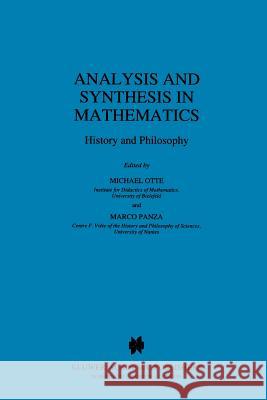Analysis and Synthesis in Mathematics: History and Philosophy » książka
Analysis and Synthesis in Mathematics: History and Philosophy
ISBN-13: 9781402002557 / Angielski / Miękka / 2001 / 450 str.
Time and again, philosophy, in trying to untangle the issues surrounding the an- alytic-synthetic distinction, has doubted that such a distinction can significantly be drawn at all. We think, in face of the varied and age-old discussions on it, that such reflections amount only to one more documentation of the tenacity of the problems behind this distinction. We could even be justified in promoting the thesis that this distinction refers to the complex relationship between the universe of meanings and the universe of objects and thus concerns each domain of human thinking where a form of objectivity is pursued. If one accepts such a thesis, one will find it very natural that this distinction has so frequently occurred in the history of mathematics and in philosophical discussions about mathematics. Since Plato, we may encounter quite a number of interpretations of the ideas of analysis and synthesis, which are related in one sense or other with mathematical thought. Mathematicians of all ages have ap- pealed to them in order to distinguish different forms and styles in their argumen- tation and expositions. Philosophers have referred to them for clarification of the specific character of mathematics in its relations to knowledge in general. In the present volume various instances of the analytic-synthetic distinction are discussed in relation to the history and philosophy of mathematics, and some new perspectives about possible interpretations and consequences are suggested.











